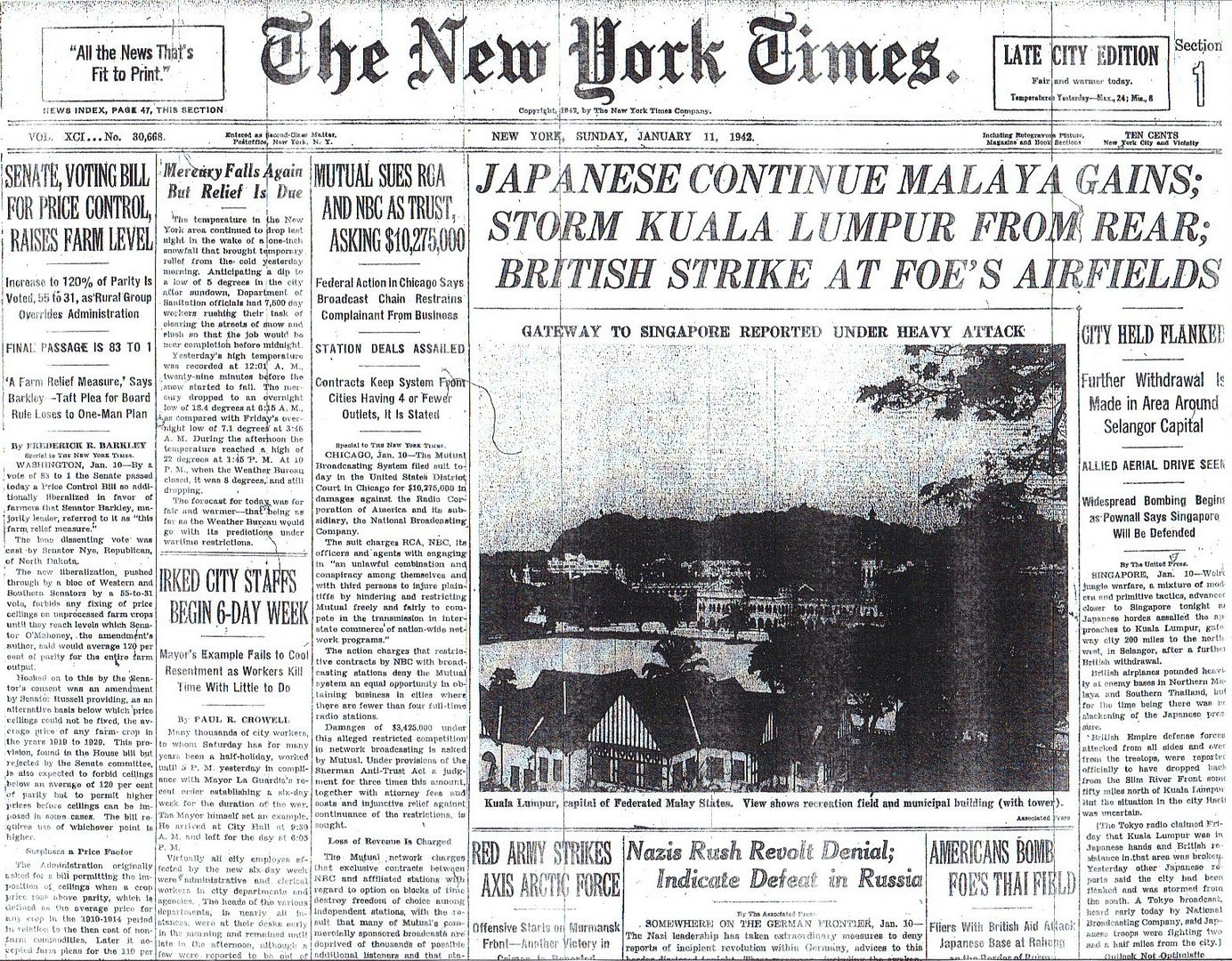
Posted on 01/11/2012 4:38:07 AM PST by Homer_J_Simpson

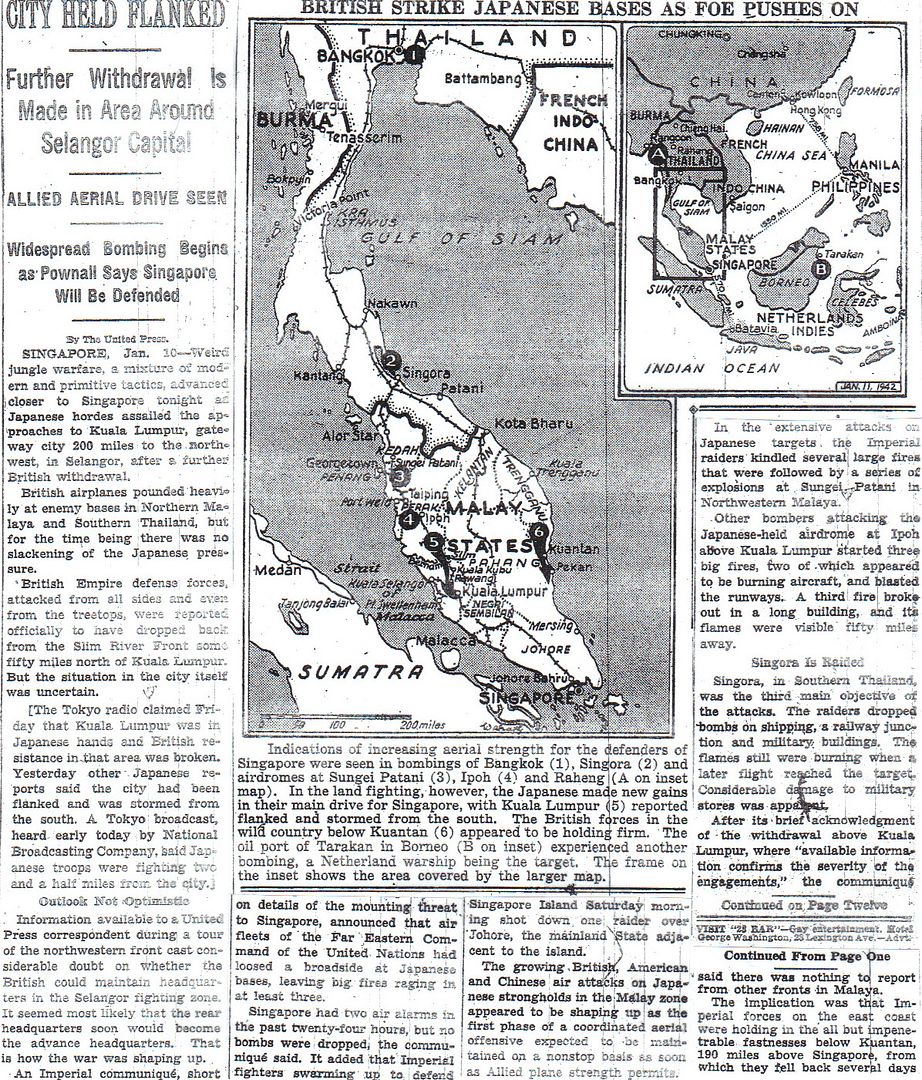
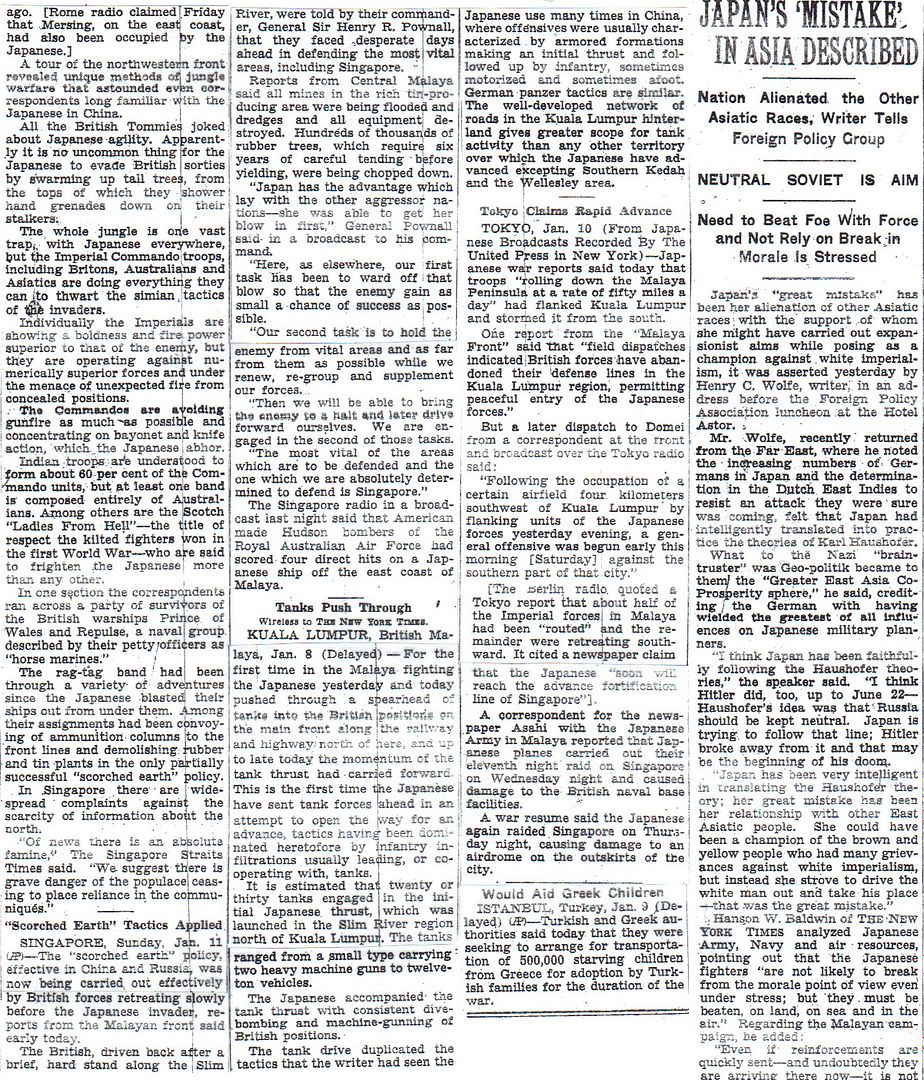
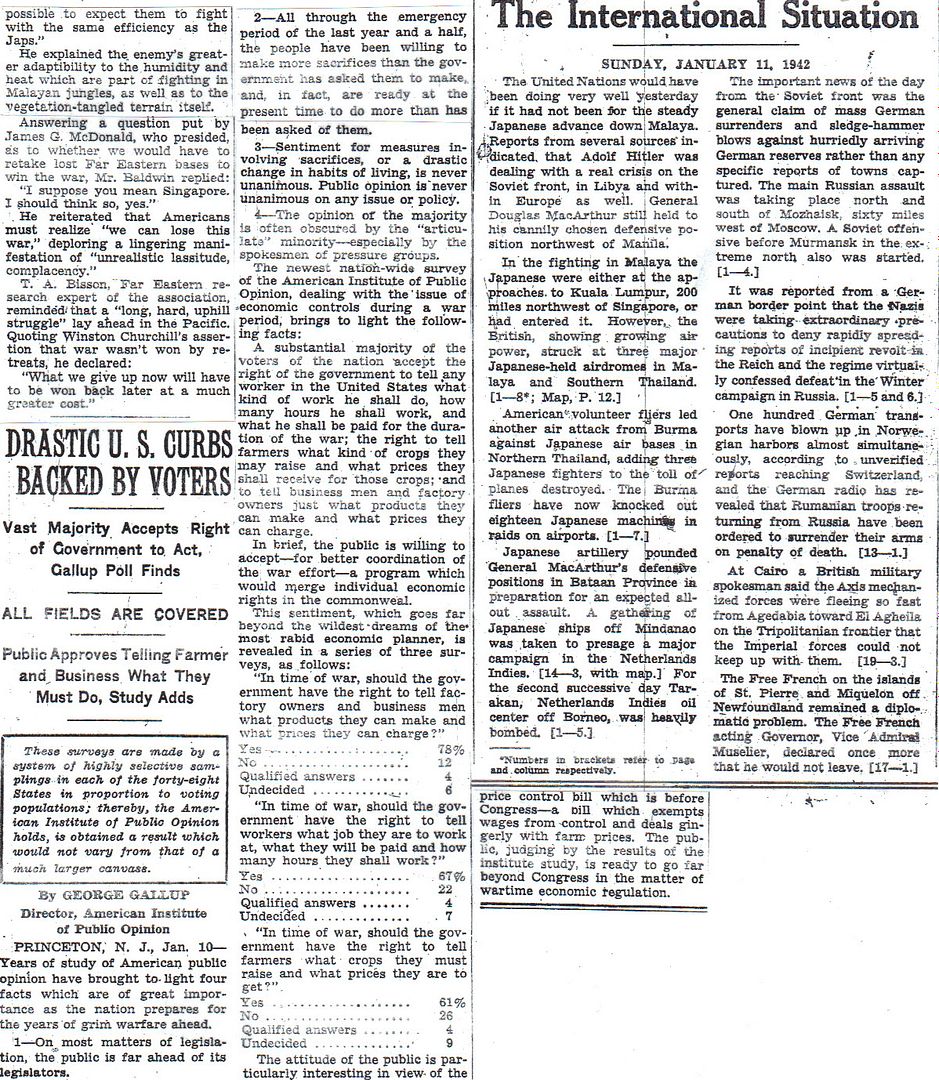
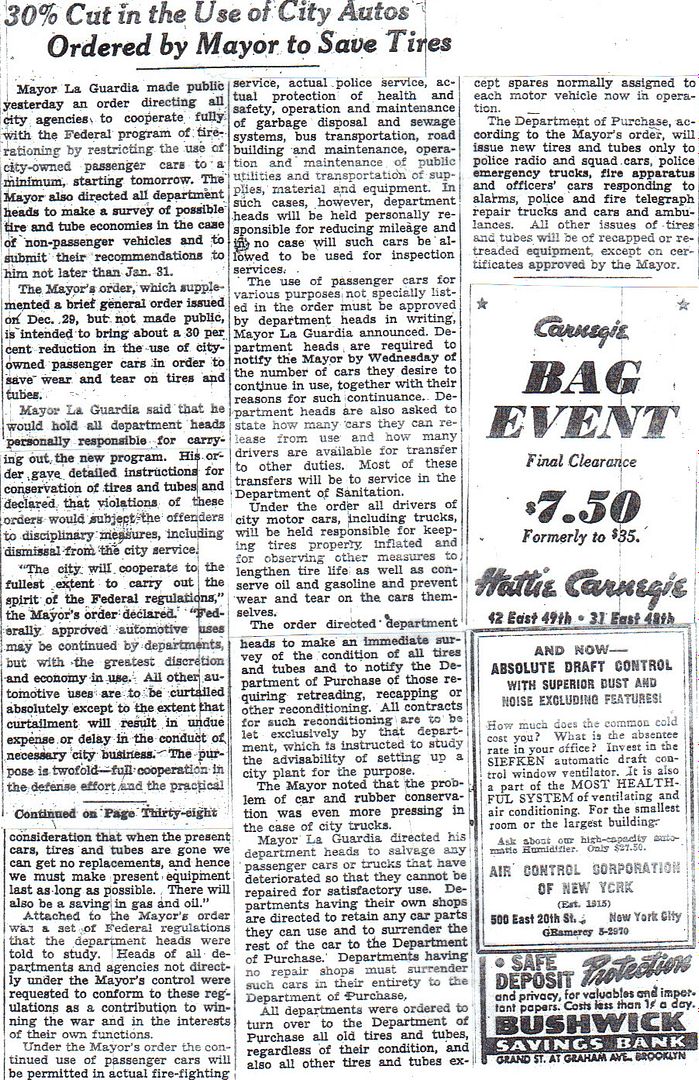
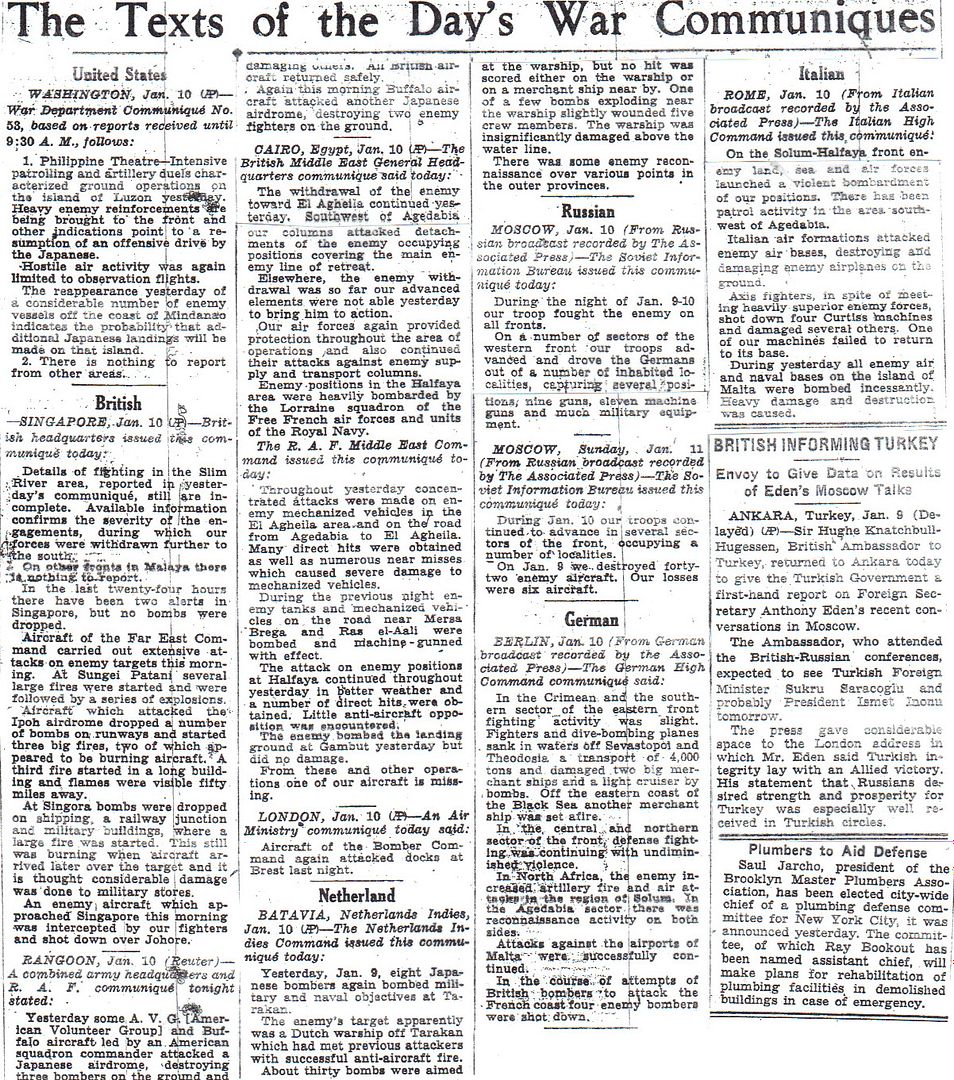
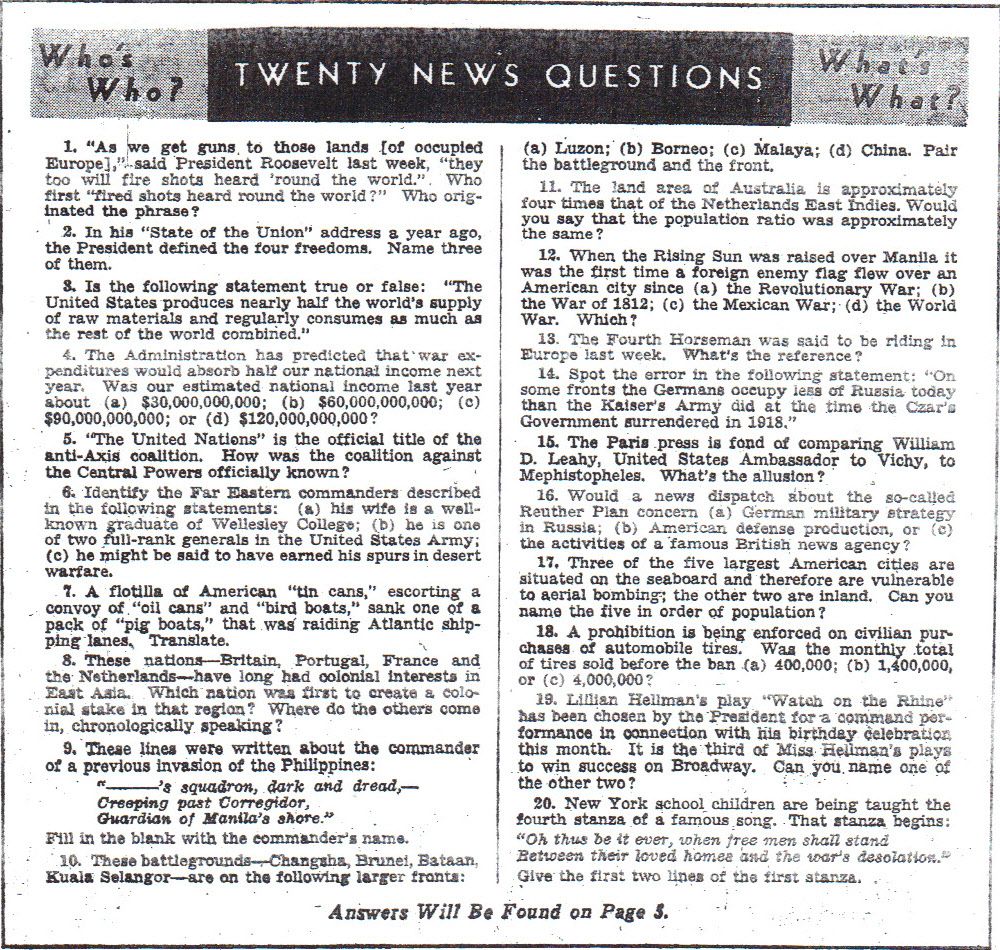
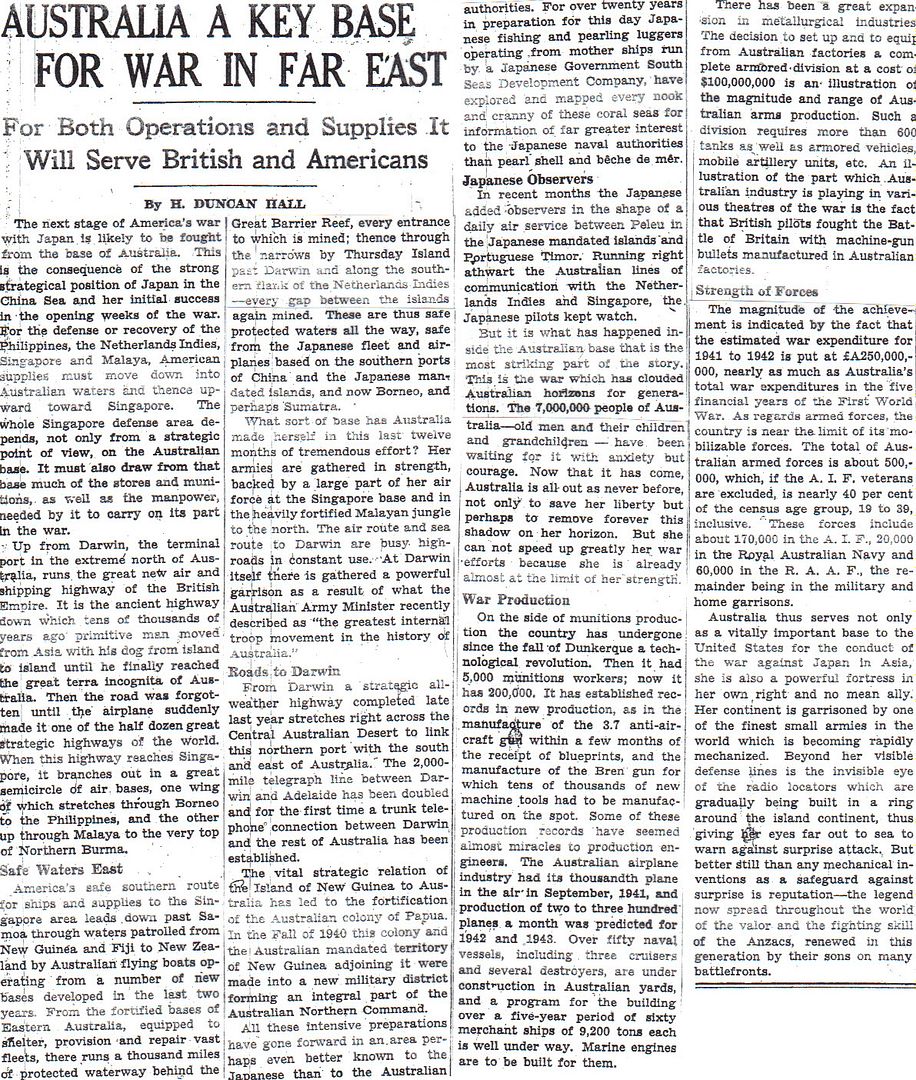
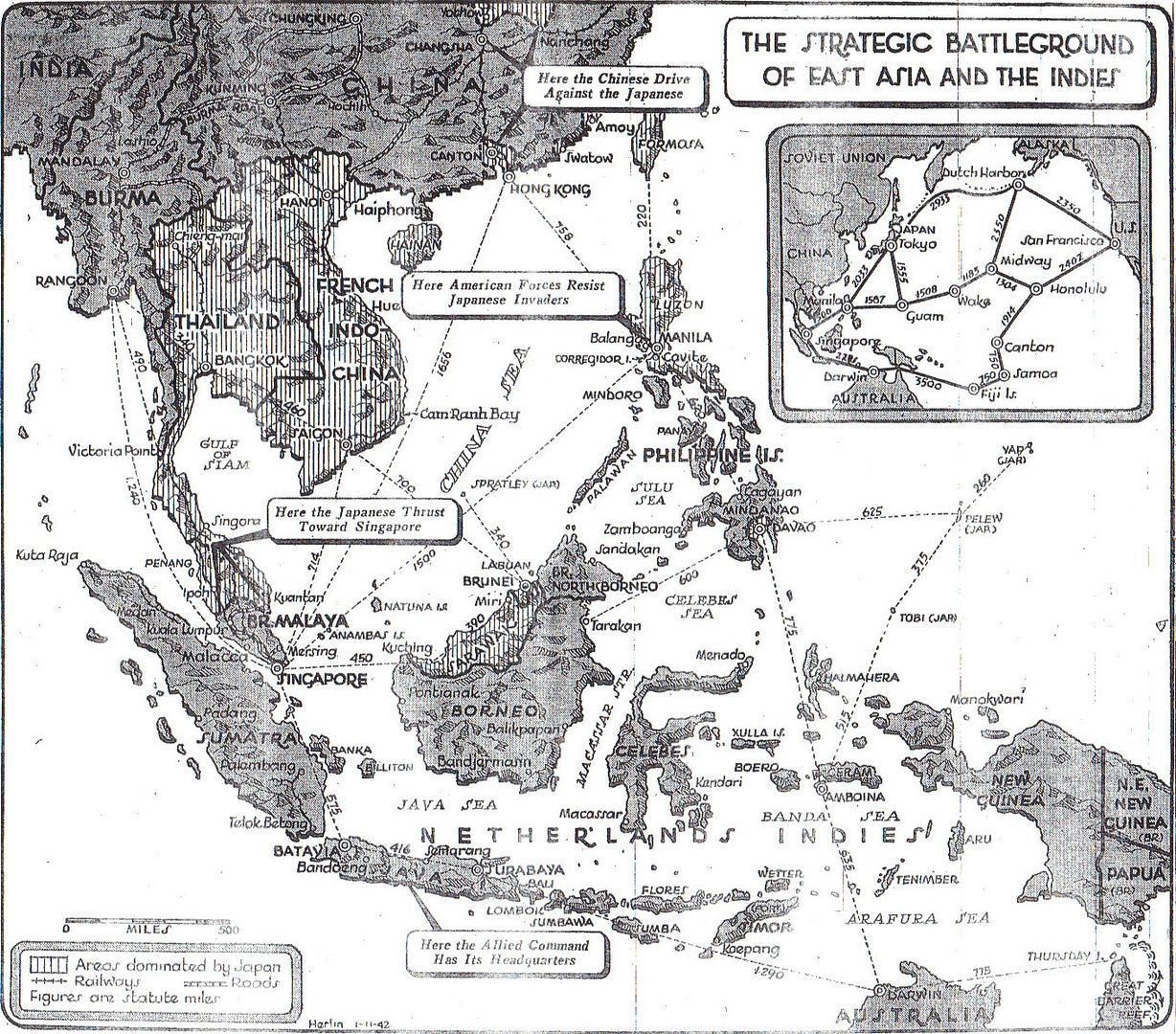
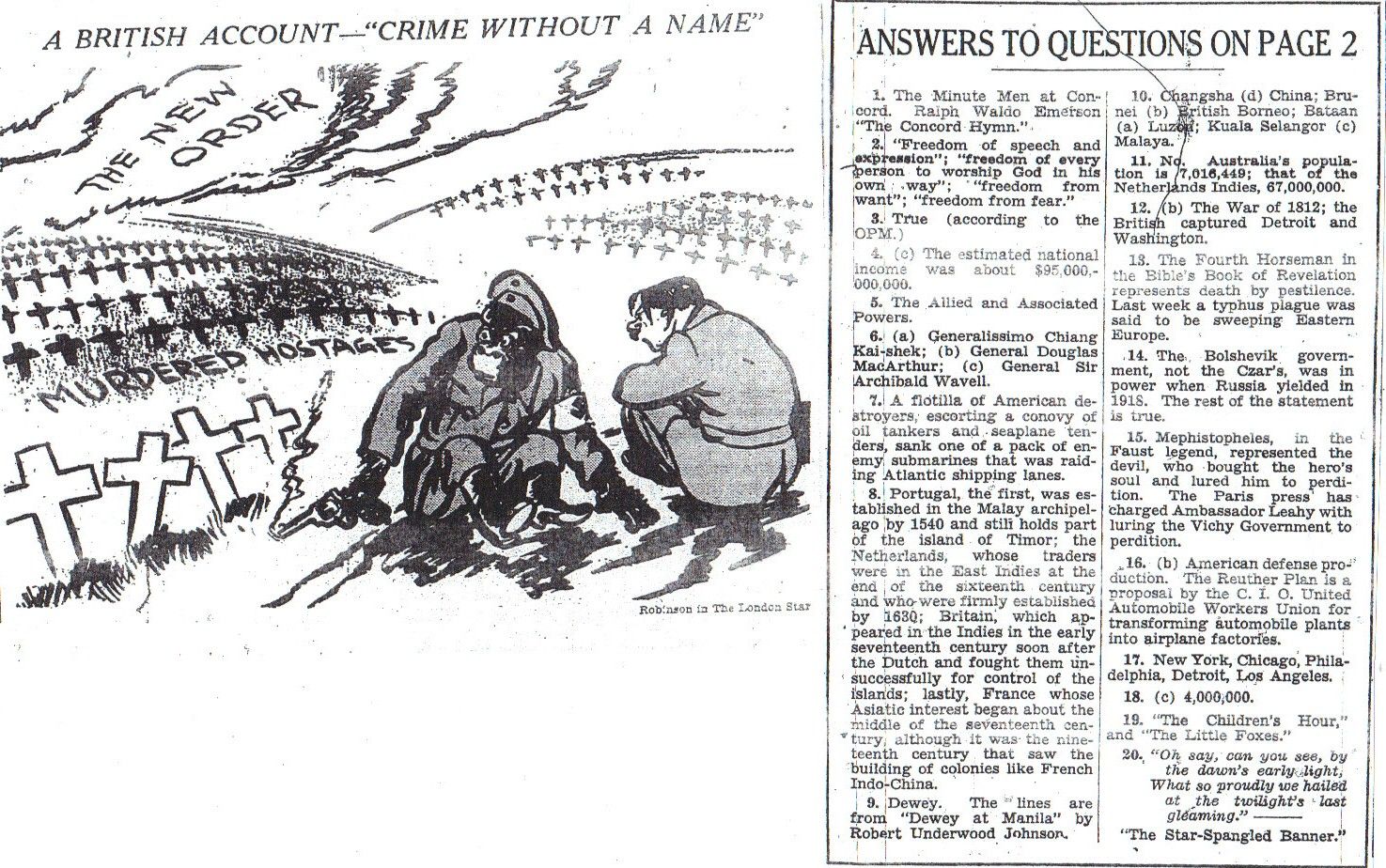
These were ahrrowing times.
The evacuation of Singapore by the civilians, wives and children of the expats there- is a horrifying story
City Held Flanked – 2-3
Drastic U.S. Curbs Backed by Voters (Gallup) – 4
The International Situation – 4
30% Cut in the Use of City Autos Ordered by Mayor to Save Tires – 5
The Texts of the Day’s War Communiques – 6
The News of the Week in Review
Twenty News Questions – 7
Australia a Key Base for War in Far East (H. Duncan Hall, first-timer) – 8
The Strategic Battlegrounds of East Asia and the Indies (map) – 9
Answers to Twenty News Questions – 10
http://www.onwar.com/chrono/1942/jan42/f11jan42.htm
Japanese invade Dutch East Indies
Sunday, January 11, 1942 www.onwar.com
General Yamashita (right) with his aideIn the Dutch East Indies... Japanese forces begin their invasion. They make landings on Tarakan and Minahassa. The Japanese task force is under the command of Admiral Takahashi and General Yamashita.
In the Pacific... The American carrier Saratoga is severely damaged by Japanese submarine I.6 near Hawaii.
Drastic U. S. Curbs Backed by Voters
By George Gallup
“Never let a crisis go to waste.”
http://homepage.ntlworld.com/andrew.etherington/month/thismonth/11.htm
January 11th, 1942
U.S.S.R.: Soviet troops on the central front push west and cut the north-south Rzhev-Bryansk railway line.
LIBYA: The South African 2d Division of 30 Corps, British Eighth Army, attacks Sollum, just across the Egyptian border, and captures it early on 12 January. 13 Corps pursues Rommel’s forces toward El Agheila, a strong natural position. (Jack McKillop)
Sollum: With bayonets fixed, South African troops stormed this Afrika Korps redoubt today, winkling out snipers from hundreds of caves on the high ground overlooking Sollum. The successful assault means that the 7,000 Axis troops remaining on the Halfaya escarpment are now cut off from seaborne food supplies and their chief source of water. The Halfaya garrison, with its command of the coastal road, is a major hazard for the British Army which is forced to divert through more than 100 miles of desert to reach the front lines.
JAPAN: Japan declares war on the Netherlands.
The Japanese did recognize and treat the Netherlands East Indies (NEI) Government as a separate entity of the Dutch government in exile. The NEI Government operated on its own apparently for the most part independent of the government in London. The NEI Government declared war on Japan on 8 Dec 1941. After the fall of the NEI, the government in London formed a consultative board on the NEI on 17 June 1942. By Royal Decree the NEI Government in exile was established on Ceylon on September 19, 1942. (Gordon Rottman and Jack McKillop)
SINGAPORE: The rapid seizure of the oil-rich Dutch East Indies - a critical target for the Japanese - began today when the Japanese used paratroopers for the first time. They landed on Menado, on Celebes, and took Langoan air base. The Dutch garrison fought hard against the Japanese, who landed from 16 transports, but were forced to capitulate after setting fire to their oilfields. Oil is critical to the Japanese who cannot wage war for long without some external means of supply. Rubber is another key need - explaining the urgency in taking the Malayan peninsula.
MALAYA: A lull develops in the ground action as the Indian 3 Corps continues their withdrawal into Lahore, but enemy planes remain active and begin series of strikes against Muar. The Japanese 5th Infantry Division rumbles into Malaya’s capital Kuala Lumpur at 2000 hours local. They find the fuel supplies have been set ablaze, but the quantity of supplies and equipment captured is immense. Japanese soldiers try out rare delicacies like corned beef and Johnny Walker Red. (Jack McKillop)
NETHERLANDS EAST INDIES: The Japanese invade at two points. The central assault force spotted by the Dutch yesterday, consisting of the 56th Regimental Group and the 2nd Kure Special Naval Landing Force (SNLF) with air support from Jolo Island in the Philippines, lands at rich oil Tarakan Island at 0000 hours. The eastern assault force from Davao, Mindanao, consisting of the Sasebo Combined SNLF and the 1st Yokosuka SNLF, invades Celebes Island at Menado and Kema at approximately 0300 hours. A Japanese Naval paratroop force of 334 men is dropped on the airfield just south of Menado and suffers heavy casualties (30 dead and 90 injured). Allied planes are unable to halt the Japanese, and the small Dutch garrisons are quickly overwhelmed. The Japanese soon put Tarakan and Menado into use as air bases from which to support operations to south.
Seven USAAF Far East Air Force B-17 Flying Fortresses based at Singosari Airdrome, Java, are dispatched to attack the Japanese landing forces on Tarakan Island. Four abort due to mechanical problems and the other three abort due to poor weather over the target.
USN Patrol Squadron Twenty Two (VP-22), with PBY-5 Catalinas, joins Patrol Wing Ten (PatWing-10) at Ambon Island, the first aviation reinforcements from the Central Pacific to reach southwest Pacific Forces opposing the Japanese advance through the Netherlands East Indies. (PatWing-10 had been based at Cavite, Philippine Islands on 8 December 1941.) Unfortunately, the PBY-5 aircraft they received in Hawaii were the early models without self-sealing fuel tanks and armour. PatWing-10 later received five newer model PBY-5 Catalinas from the Dutch in Java. All of the rest of the PatWing’s original aircraft were the older PBY-4 models. Almost immediately after arrival several of the VP-22 Catalinas were caught at anchor at Ambon and destroyed. (Jack McKillop)
PACIFIC OCEAN: USS Saratoga (CV-3) is damaged by IJN submarine HIJMS I-6, while cruising 420 miles southwest of Oahu, TERRITORY OF HAWAII, as part of TF-14,aiming for a rendezvous with the aircraft carrier USS ENTERPRISE (CV-6). The torpedo hit on the port side amidships. Six men are killed and three firerooms are flooded. Damage was moderate and caused significant problems for her engines, mostly through shock damage to the turbo-electric drive and through contaminated fuel oil. However, she easily makes 16 knots and can launch and recover aircraft. The carrier returns to Oahu. (Mark E. Horan and Jack McKillop)
COMMONWEALTH OF THE PHILIPPINES: In the II Corps area on Bataan, the Japanese advancing down the east coast of Bataan drive back the outpost line of the 57th Infantry, Philippine Scouts, cross the Calaguiman River, and after nightfall begin an assault on the main line of resistance, forcing the 57th Infantry to fall back a little. Fighting continues throughout night of 11/12 January. Reserves are committed and the 57th Infantry counterattacks, regaining most of lost ground by dawn of 12th. To the west, another enemy column shifts west in the sector of 41st Division, Philippine Army (PA), and is contained by that division. Advance elements of still another column, pushing slowly south in central Bataan toward the 51st Division (PA), reach the Orani River by morning. (Jack McKillop)
Both Japanese Navy Parachute units jump at Davao on Mindanao in the Philippines. (Gordon Rottmann)
SAMOA: Naval Station Pago Pago is shelled by a Japanese submarine. (Jack McKillop)
ATLANTIC OCEAN: Operation Paukenschlag (”roll of the kettledrums”) descends upon the eastern seaboard of the U.S. like a “bolt from the blue.” The first group of five German submarines takes up station off the east coast of the United States on this date. Over the next month, these boats (U-66, U-109, U-123, U-125 and U-130) will sink 26 Allied ships; the presence of the enemy off the eastern seaboard takes U.S. Navy antisubmarine forces by surprise. The first ship, the British freighter SS Cyclops, is sunk by U-123 300 miles (483 kilometres) east of Cape Cod, Massachusetts. (Jack McKillop)
U.S.A.: The plan to dispatch the U.S. V Corps, reinforced, and air and supply forces to Northern Ireland (Operation MAGNET) is approved. (Jack McKillop)
Note that all of these questions began with "In time of war ..." And there was a real war then. Comparing that time to ours now is silly, IMHO.
ML/NJ
My point is that collectivists never - no matter the situation - always look for an opportunity to curtail individual rights and expand government powers.
Always.
The native population of Singapore, which is largely Chinese, will likely suffer an especially horrifying fate if the city falls to the Japanese--Like Nanking in '37, only on a smaller scale.
The stables and cattle-sheds of the Voin collective farm were buried deep in snow on the wide plain between Orel and Mtsensk.
Major-General Nehring had established there the headquarters of his 18th Panzer Division, and Lieutenant Winter, in charge of his headquarters, had placed the tractors and combine harvesters, old Soviet lorries and German armored infantry carriers, between the sentries and buildings of this former imperial estate in such a way that a veritable fortress had been created, a divisional headquarters 'hedgehog.'
This was a necessary caution because the winter war, with its swift and dangerous Russian penetrations and attacks by partisans, had made even the higher command headquarters potential front-line positions. These therefore constituted a system of fortified strongpoints between the thin German main fighting-line and the rearward areas.
Major-General Nehring had just returned from a visit to the front. His chief of operations, Major Estor, met him with the words: "The Commander-in-Chief urgently asks you to telephone him. Something's up. He wants you to ring him at once."
Nehring had himself connected with Colonel-General Schmidt, Guderian's successor as C-in-C Second Panzer Army. It was a short conversation. Schmidt said, "We need you. Would you come over tomorrow morning, please. It's an important matter."
Major Estor's log entry of the telephone conversation is dated Tuesday, 6th January 1942.
On the following morning Nehring drove to Orel, a bustling base in the hinterland which had become a front-line town almost overnight. Colonel-General Schmidt was not there. He had driven over to General Kubler, who had been in command of Fourth Army since Christmas and who now found himself very hard pressed by the enemy. Nehring was received by the Chief of Staff, Colonel von Liebenstein. First of all the colonel served him some heated-up chicken broth straight from the tin—a detail the general remembered to his dying day. It was most welcome after the drive through the frosty winter waste.
Without any preliminaries Liebenstein came to the point:
"The situation in the gap between Belev and Kaluga is getting more and more critical. Unless something is done Fourth Army will be in serious danger."
He pointed to the map.
"These strong Soviet forces are already deep in Kubler's rear. Fourth Army headquarters in Yukhnov has already become the front line. We've got no reserves. True, General von Gilsa's 216th Infantry Division was switched by the High Command from France to Sukhinichi towards the end of December, because until then the first Soviet assault was being held by hurriedly scraped-up forces. But now units of Gilsa's division have been encircled by the Soviet Tenth Army. Gilsa is resisting desperately. His men are very well equipped and are a brave lot-but they are unaccustomed to such winter conditions and can only inadequately be supplied from the air. Gilsa already reports some thousand wounded. But if this last breakwater is washed away it will mean disaster."
Nehring stood in front of the situation map, studying the red arrows and loops in the notorious 50-mile breach in the front between Kaluga and Belev—the breach which had been the nightmare of all headquarters personnel for the past fortnight.
"And what is to happen?" Nehring asked.
Liebenstein answered,
"We've no other choice but to detach units from our Orel front, hard-pressed though we are ourselves, in order to stabilize the situation in the gap. We must link up with Gilsa again and strengthen his defensive front. And that is where you come in with your well-tried 18th. Needless to say, you'll be given some further forces, to be put under your command. We have in mind 12th Rifle Regiment, 4th Panzer Division, and Major-General von Scheele's 208th Infantry Division, which has just arrived from France and is at present employed as flank cover south of Belev. Admittedly, we've taken 309th and 337th Infantry Regiments away from the division because they were urgently needed by Ninth Army in the Sychevka area."
Nehring, an experienced commander in many critical situations, was not exactly pleased with the assignment. But he realized the need for the action.
The regiments took ten days to cover the roughly 125-mile journey from their sector via Orel, Bryansk, and Ordzhonikidzegrad to the assembly area near Zhizdra. Their journey in a temperature of 40 degrees below zero, through three-foot-deep snow and mountainous drifts, was sheer hell.
Captain Oskar Schaub from Vienna, a battalion commander in 12th Rifle Regiment, has described the way the units struggled through open country. The narrow wheels of guns and supply vehicles, he recalls, sank into the snow up to their axles. Lorries kept getting stuck. On the whole, the horse-drawn units managed best. The tough little farm-horses averaged about three miles an hour with their carts or sledges. The motorized troops with their tracked and wheeled vehicles managed barely more than a mile—half as much as a pedestrian would cover under normal conditions. The horse, in fact, was greatly superior to motor vehicles and armor in these conditions. The result was that all Panzer divisions were equipping themselves with horses during the winter.
On 16th and 17th January the reinforced 18th Panzer Division got ready to move off from Zhizdra.
Its left wing was covered by 12th Rifle Regiment under Colonel Smilo von Lüttwitz, while the right flank was protected against enemy surprise attacks by units of 208th Infantry Division. Strong patrols on skis screened the area of the advance. Makeshift snow-ploughs cleared the road for the marching columns. Operation Sukhinichi got going. It was one of the most extraordinary, harebrained, and risky operations of the winter war.
Nehring's thoughts on the attack: "A piece of strategic impertinence."
He was right.
In the Sukhinichi area there were no fewer than thirty Soviet rifle divisions operating, as well as six rifle brigades, four armored brigades, two air-borne brigades, and four cavalry divisions. That was a truly gigantic force—an elephant about to be attacked by a mouse.
However, cunning, skill, and daring succeeded in out-maneuvering the Russians. The mouse slipped into the elephant's trunk.
Colonel Kuzmany, the one-armed Austrian commander of 338th Infantry Regiment, was standing up on his little peasant sledge. He was driving at the head of his combat group. Under him were three battalions, reinforced by tanks and artillery. His thrust was in the middle of the attack, via Bukan and Slobodka towards Sukhinichi. Colonel Jolasse, commanding 52nd Rifle Regiment, cleared some elbow-room for Kuzmany on the left flank and in the rear, and with his combat group attacked the strongly defended township of Lyudinovo. His force consisted of two battalions, the Panzer Company von Stunzner, the 2nd Company Panzerjäger Battalion 88, and a battery of 208th Artillery Regiment. The Russians were completely taken by surprise: they had not expected an attack so far from the fighting-line by German forces emerging like phantoms from the snowy wastes.
The companies of Jolasse's combat group dislodged the enemy from Lyudinovo and chased him into the forests and the snow-covered lake district. In ferocious street fighting against Soviet emergency units the battalions Wolter and Aschen cleared a road through the town. This first engagement yielded a considerable quantity of captured weapons, 150 prisoners, and over 500 killed.
Kuzmany meanwhile also battered his way through a surprised enemy.
Wherever the Russians attempted to offer resistance they were smashed by concentrated fire from all weapons. First Lieutenant Klauke, commanding 2nd Battery, 208th Artillery Regiment, stood on a sledge directing the fire of field howitzers. Attacking battalions were dispersed and machine-gun and mortar positions smashed at point-blank range.
There was no time for the gunners to aim their guns by calculation. "A quick look through the barrel, and you knew the direction was all right" is how Corporal Werner Burmeister, a gun-layer in 2nd Battery, recalls the situation. Colonel von Lüttwitz meanwhile with his reinforced 12th Rifle Regiment was working his way forward in the deep western flank of Nehring's formations. Captain Schaub records in his report of engagement: "The wheels kept getting stuck in the chest-deep snow. Working till late at night, the 2nd Company shoveled their way through to a signal-box on the Ordzhonikidzegrad-Sukhinichi line. The temperature was 40 degrees below. Rifles and machine-guns had to be wrapped up as carefully as the men's noses and hands, or else the oil would freeze—and that could be fatal."
Every yard of their way had to be shoveled clear. And at any moment the enemy might appear from the right, from the left, from behind or from in front. Out of this situation Lüttwitz evolved a novel fighting method. Schaub describes it as follows: "The point company would struggle through the deep snow along both sides of the road to the nearest village and attack the enemy in this narrow deep formation, working like an assault detachment. The attack would be opened with concentrated mortar-fire. After that the hand-grenade was the principal weapon—or, at close quarters, the trenching-tool. Meanwhile the remaining companies would shovel the road clear for the motor vehicles. Thus our combat group resembled a slowly moving hedge-hog."
The front line was everywhere. Even the divisional headquarters personnel had to fight for their lives on 20th January, when, late in the evening, a Russian battalion charged Slobodka in the snowy light of a minus forty five degree chill. They were saved by a 2-cm. AA gun of the headquarters security detachment until the sapper battalion hurried to the scene to retrieve the situation.
Thanks to this bold improvisation and the continuous alternation of attack and defense, advance, flank-screening, and rear cover, "Operation Sukhinichi" succeeded. Two weak divisions had slashed a 40-mile-long corridor right through an enemy Army, to reach a besieged strongpoint.
On 24th January at 1230 hours Colonel Kuzmany shook hands with a battle outpost of the combat group under Freiherr von und zu Gilsa. A bridge had been built to the cut-off 216th Infantry Division and the formations subordinated to it. It was a narrow bridge, but it held. The following morning Nehring drove into the town to discuss the situation with Gilsa. A thousand wounded were lying in the cellars of the ruined houses: to get them out was one of the most urgent tasks since there was no doubt they would be murdered if Soviet troops captured them. This, like everything else about this operation, was done in an unconventional way. Five hundred local sledges with Russian peasants and prisoners as drivers were available in Lyudinovo. Each sledge could accommodate only one wounded man. Every driver, therefore, had to make the 40-mile trip through no-man's-land four times. But not a single one dropped out. Every one of them stood up to the tremendous demands made by the night-time sleigh-ride through biting frost, blizzard, and enemy patrols.
In command of this mercy fleet was a corporal—a village priest in civilian life. His assistant was a cavalry sergeant. Their helpers were 500 Russians. The two Iron Crosses which Nehring had earmarked for them were never awarded: the two good Samaritans disappeared into the turmoil of battle. Their names are not known.
The importance of Operation Sukhinichi in the general situation is reflected by the fact that Hitler paid tribute to it in a special announcement. This was his way of demonstrating that surrounded units which obeyed his order and held on as breakwaters regardless of being bypassed by the enemy would not be forgotten. This demonstration was an important prerequisite for the troops' perseverance at other points of the front where major or lesser formations were encircled, as, for example, at Kholm and Demyansk. "They'll get us out": this unshakable belief of surrounded troops and their officers was justified time and again during that winter of 1941-42.
It is a point that must be remembered by all those who to-day shake their heads in uncomprehending amazement at the blind faith shown a year later by the encircled German Sixth Army at Stalingrad.
Sukhinichi was a decisive strategic success. Nevertheless, in a sound appreciation of the situation, Lieutenant-General Freiherr von Langermann-Erlenkamp, commanding XXIV Panzer Corps, decided to evacuate the exposed town of Sukhinichi itself. This move made it possible to establish a more favorable defensive front across that notorious breach which was now being closed again. The nightmare of the German High Command was at an end. Conditions had been created for smashing the southern prong of the Soviet offensive.
After weeks of heavy fighting, lasting well into the spring, the bulk of the divisions of the Soviet Tenth and Thirty-third Armies, the I Guards Cavalry Corps, and the 4th Parachute Commando which had penetrated, were annihilated south-east of Vyazma.
This was the great battle in the Ugra bend, with its focal points at Ukhnov, Kirov, and Zhizdra. In this battle downright superhuman feats were performed by the divisions from Brandenburg and Bavaria, from Schleswig-Holstein and Mecklenburg, the Upper Palatinate and Hanover, from Hesse and Saxony, as well as by the independent 4th " Death's Head " SS Regiment and the Parachute Assault Regiment Meindl.
What this savage fighting looked like from the other side is revealed by two impressive documents—both of them captured diaries of Soviet officers. They afford a glimpse of the morale of the Russian front-line troops in the Sukhinichi-Yukhnov-Rzhev area.
The first diary is that of Lieutenant Goncharov, a company commander and temporary battalion commander in 616th Rifle Regiment. He was killed in action north-west of Yukhnov on 9th February 1942. The second diary is that of a lieutenant of 385th Rifle Division whose name had been proposed for the title of " Hero of the Soviet Union." Since it is not certain whether he lived, his name shall not be given here. Both diaries are extant in the original and come from the archives of the Intelligence Officer of the German XL Panzer Corps. Goncharov's notes reveal a simple soul-a man who believed in Stalin's political slogans, was annoyed with his superiors, and passed on all kinds of front-line gossip. The entries are revealing in many ways:
2nd January 1942. When the 4th Battalion withdrew from Yerdenovo we had to leave our dead and wounded behind. The wounded were killed by the Germans.5th January 1942. I talked to the civilian population about the Germans. Generally speaking, they all tell the same tale— looting, executions, rape. But it strikes me that they relate these fascist atrocities without revulsion. They talk about them just as though they are reporting a lecture by the collective farm chairman. And yet, how revolting is everything about that Aryan race! No sense 'of decency. They strip themselves naked in the presence of women and kill their lice. We have always regarded the Aryans as people of culture. Now it is clear that these Aryans are dull, stupid, shameless bourgeois.
10th January 1942. I have read Molotov's note to-day about the German atrocities. One's hair stands on end when one reads the few examples listed. In my opinion the world has not room enough for retribution for all that this Nordic race has inflicted on us. But we shall have our revenge—we shall have it of their whole race—in spite of our very humane and moderate leader Stalin. To hell with international considerations! Sooner or later we shall have to fight England as well.
14th January 1942. At Shanskiy Zavod I slept at the home of a woman partisan. Nearly half the village collaborated with the Germans. The partisans were not only not supported, but betrayed and opposed. I had to get up at three in the morning to get back to the front. It was difficult. I had slept on a warm stove. It was covered with white tiles which I had never come across before. I must confess it looked very good.
23rd January 1942. The Germans are in the village of Agroshevo, nine miles behind us. It's freezing hard. I had to rub my nose with snow several times—otherwise it would have frozen off. Some 50 per cent, of my men have frostbitten noses; in some of them gangrene is beginning to develop. By nightfall it was clear that we were surrounded. No supplies coming through. We are hungry.
25th January. "You know, Comrade Lieutenant," one of my men said to me yesterday, "when one gets really cold one becomes indifferent to freezing to death or being shot. One only has one wish—to die as quickly as possible." That's the exact truth. The cold drains the men of the will to fight.
26th January 1942. At midnight a breakout attempt was mounted towards Rubikhonov. The 4th Company tried to envelop the enemy from the left, with one machine-gun and three mortars. One mortar-shell hit the machine-gun crew of my No. 1 Platoon. Three men were wounded and three men killed. One of the wounded screamed, cried, and begged to be carried out of the fire. Another implored me to shoot him dead. In the open the frost was so hard that I could not bandage the man, because I would have had to undress him. I only had the choice between letting him freeze to death or bleed to death. The battalion is down to 100 men, including headquarters staff and supplies. In the main fighting-line only 40 to 50 men are left. Our strength is ebbing away. These damned Germans fight like the devil.
1st February 1942. Zass is no longer our regimental commander. I'm very pleased. The man was perpetually drunk. While drunk he would make idiotic decisions, and as a result of these we have lost a lot of men.
6th February 1942. Several men of the Ski Regiment were shot to-day because of pilfering, going absent without leave, and offences while on sentry duty.
8th February 1942. The Germans are attacking.
That is the last entry. Goncharov was killed in action near Papayevo, six miles north-west of Yukhnov, on 9th February 1942, fighting against formations of the Hessian 34th Infantry Division. His regiment was smashed.
The author of the second diary, Second Lieutenant V., was a very different man from Goncharov. He too was employed south-east of Vyazma. Facing him were units of the German 19th Panzer Division and the 3rd Motorized Infantry Division. Fanatical, ambitious, yet astonishingly clear-sighted, this young "Hero of the Soviet Union" is interesting source material for the study of the lower commands of the Red Army. Clearly this lieutenant had on several occasions averted dangerous situations for his regiment. "The company's morale," he wrote on 7th February 1942, "is excellent—if it were not for the disastrous food situation. If only the men had enough to eat one could win any battle with them."
On 10th February we read:
I intended to submit my application for Party membership since I believed we would go into action to-day. I shall only hand if in just before a battle, so that no one would suspect me of seeking personal advantage. 19th February 1942. Yesterday I handed in my application for Party membership, to become a Bolshevik. In the evening I was ordered to go out with only my sub-machine-gunners and take the forest which 3rd Company had been unable to take. It's a formalistic plan. But orders are orders. I'm off in an hour.I have become weak from this nomadic life of the past year. Yesterday I had an upset stomach from the bad bread and frozen potatoes. But I've got to remain in harness. Last time I was away from the company for twelve days all discipline went to hell. If only these damned supplies would get through! The men would charge into a rain of bullets without batting an eyelid. But they are hungry. They are losing their strength. The weapons, too, are getting rusty: we've got no lubricating oil. Yesterday I organized a meeting in a barn, together with the political commissar. I explained why fascist prisoners must be allowed to remain alive—as a source of information.
The entry after the attack reads:
My thirty men received spirits and several tins of cigarettes, biscuits, sausage, and butter from the CO's personal-disposal supplies. 24th February 1942. As from to-day I am a probationer for Party membership. I'm beginning to get enthusiastic about the war. I would have made quite a good partisan. 25th February 1942. To-day sapper-instructor B. arrived. When he was told that he was in the front-line he got very dejected and asked Gladev to play a funeral march to him on his guitar. Gladev obliged. Fifteen minutes later B. was killed. Fate? Or do the bullets seek out the cowards? 26th February 1942. I had my photograph taken to-day for the Party papers. We are being sent on a special mission. My company is ready for action. I hope they are not sending us in daylight: that would be dangerous and stupid.The Red Army must fight at night. 27th February 1942. I had to carry out a court-martial sentence—an execution. In response to my question three men volunteered at once. The two culprits had hidden themselves while out on patrol and had shirked action. Silly fools! They thought they could escape honorable death and now had to die ignominiously. 4th March 1942. At last a letter from my wife: I keep re-reading it. Letters from home bring joy and pain.The men stood up well, and the attack was successful. Ten Germans were killed and five taken prisoner. Four of these we had to shoot because they refused to come back with us.
The bulk of our active officers went to Officers' Training Courses only for the sake of the uniforms and the gold collar-flashes. They are better at marching than tactical knowledge, and better at making reports than carrying out orders. At best they know how to charge and be killed.
This ambiguous sentence is the last entry. It dates from the time when Soviet hopes of a victory on the Central Front were evaporating.
From this time also dates the letter of a young Russian. Addressed to a friend, it was found in his pocket, unfinished, when he was killed near Dorogobuzh. It is quoted here for all those, wherever they may be, who lost friends in the war. It may even be that its reproduction decades after it was written will enable it at last to get to its addressee. It reads:
I do not know how and where I shall die, whether I shall be hit by the bullet of a German machine-gunner, torn apart by an aerial bomb, or killed by a shell-burst—but each one of these possibilities terrifies me equally. I have seen hundreds of men killed. I have repeatedly heard the rattle of death in the throats of comrades with whom I had cheerfully eaten a meal out of the same mess-tin a little while before. I have met death face to face many times. Once a shell-splinter tore my cap off my head. Another time a bullet went through my mess-tin so that my soup ran out and I was left hungry. But never before have I been so afraid as now.Greetings, dear friend! Greetings and also farewell—because I am no longer alive.
This letter will be sent to you only in the event of my death. But that day is not distant— I can feel it. I do not know how long this letter will remain in my pocket, crumpled, but sooner or later it will reach you to remind you for a last time of your schoolmate.
I feel an urge to say a great deal to you on this final occasion—a great deal. I want to pour out my whole sadness of unfulfilled hopes, to communicate to you my fear of this unknown death. Yes, dear friend, fear—for I am afraid of what comes after death.
Look about you—spring is coming. The six letters of this word keep disturbing me. For this is no ordinary spring—this spring I shall be twenty. Twenty years old—almost a man. And to die just when nature is smiling upon you, when your heart pounds with joy because of a bird's song or the gentle caress of the moist spring breeze. . . .
It was spring when this letter was written. But at the time when the German gunner Burmeister was aiming his light field howitzer at Lyudinovo, when the unending columns of sledges were evacuating the wounded from Sukhinichi, when the machine pistols stuttered at the Ugra bend, and when all along the front shouts were going up: "Russian tanks breaking through!" snow was still lying several feet deep on the battlefields of the Eastern Front.
But the winter battle had already been decided.
True, the men in the front line did not yet realize this. They were still engaged in exceedingly heavy defensive fighting. But the maps at the Army headquarters were already revealing the truth: the great crisis at Army Group Centre was over.
Mobile Soviet cavalry formations continued to advance as far as Dorogobuzh, east of Smolensk, during the next few weeks, but these were the last waves of a drive that had lost its momentum. The Soviets had reached the end of their offensive strength. They had failed to reach the strategic objective of their winter battle—to destroy Army Group Centre and thus cause the entire German Central Front to collapse.
The turning-point had been due to two things. First, the Soviet High Command had bitten off too much. Operational leadership, conditions, and supplies for their offensive Armies had not been up to such far-reaching aims.
The second reason was the outstanding achievements of the German formations in denying the Soviets their success and preventing disaster. In terms of discipline, gallantry, hardships, and self-sacrifice, officers and men had surpassed anything previously known. Military organization had remained intact and capable of functioning in spite of the troops being overextended, in spite of hunger and inadequate clothing. That was how the situation was saved at the threatened Central Front in the winter of 1941-42. That alone ensured the success of Hitler's hold-on order and of the tactics of hanging on to vital reinforced positions.
Thus Rzhev was saved and Sukhinichi relieved. At the last moment and with the last ounce of strength the enemy was kept off the Smolensk-Moscow motor highway. The encirclement of Army Group Centre was prevented. The great crisis on the Central Front was, on the whole, overcome. But it was a near thing!
"These Viennese Jews were deported to the East.
The Nazis hoped to make Vienna "Jew free," and shipped the city's Jews to ghettos in Poland beginning in 1939.
On January 11, 1942, German authorities deported approximately 1500 Viennese Jews to Riga, Latvia, many of whom died on the journey.
One survivor of the deportation remembered that "there was no water. The coaches were sealed....It was very cold, and we chipped off some ice from the windows to have water."
The children and elderly who survived this ordeal were murdered upon reaching their destination."
I didn’t do so well on the quiz. I missed 10 of 37 total answers, or six of the 20 for a C.
This torpedo attack will leave the Saratoga unavailable for the Battle of the Coral Sea as well as Midway (just barely).
Disclaimer: Opinions posted on Free Republic are those of the individual posters and do not necessarily represent the opinion of Free Republic or its management. All materials posted herein are protected by copyright law and the exemption for fair use of copyrighted works.